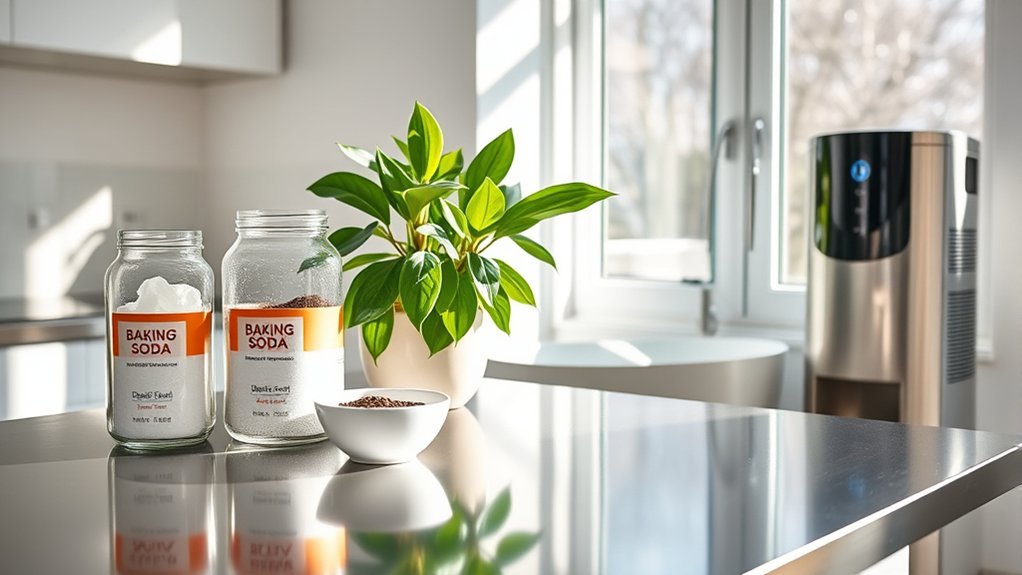Odor management is essential for creating a pleasant living environment. You need to identify the sources of unpleasant smells before you can effectively tackle them. This involves a systematic inspection and the use of targeted cleaning techniques. Once you’ve addressed the immediate issues, exploring natural remedies can enhance the freshness of your space. By understanding the steps involved, you can maintain a clean atmosphere and prevent future odor problems. What strategies will you implement first?
Identifying the Source of Unpleasant Odors
How can you effectively pinpoint the source of unpleasant odors? Start by conducting a systematic inspection of your environment. Move from room to room, noting any areas where the smell seems strongest.
Pay attention to hidden spaces like behind appliances, under sinks, or in closets. Check for dampness, which often indicates mold or mildew. Examine food storage areas for expired items, and inspect trash cans for lingering debris.
Use your sense of smell to guide you, but also consider using your eyes—look for stains or discoloration that may indicate a leak or spill. If odors persist, consider enlisting a friend to help, as fresh perspectives can sometimes identify sources you might overlook.
Identifying the source is vital before implementing any remediation strategies.
Effective Cleaning Techniques for Odor Removal
Effective cleaning techniques are essential for successfully removing unpleasant odors from your environment.
Start by thoroughly vacuuming carpets and upholstery, as they can trap odors. Next, use a mixture of warm water and a mild detergent to clean surfaces, paying special attention to areas that may harbor stains or spills.
Thoroughly vacuum carpets and upholstery, then clean surfaces with warm water and mild detergent to eliminate trapped odors.
For fabrics, consider steam cleaning or washing them according to care instructions. Don’t forget to clean hard-to-reach spots, like behind appliances.
Additionally, regularly empty trash bins and sanitize them to prevent lingering smells. Use an enzymatic cleaner for biological odors, as it breaks down the source.
Finally, guarantee proper ventilation during and after cleaning to allow fresh air to circulate, further aiding in odor removal.
Natural Remedies for Freshening Up Your Space
While commercial air fresheners can mask odors temporarily, natural remedies offer a more sustainable approach to freshening up your space.
Essential oils, like lavender or lemon, can effectively neutralize unwanted scents. Simply add a few drops to a diffuser or mix them with water in a spray bottle.
Baking soda is another excellent option; it absorbs odors when placed in an open container.
Vinegar, known for its deodorizing properties, can be used in a spray solution to tackle stubborn smells.
Additionally, placing fresh herbs, like mint or rosemary, around your home can provide a pleasant aroma.
These natural alternatives not only enhance your environment but also contribute to a healthier indoor atmosphere free from synthetic chemicals.
Maintaining a Fresh Atmosphere Daily
To maintain a fresh atmosphere daily, it’s essential to establish a routine that incorporates both preventive measures and regular cleaning.
Here are four effective strategies to help you achieve this:
- Ventilate: Open windows regularly to allow fresh air to circulate and reduce stale odors.
- Clean Surfaces: Wipe down countertops, tables, and other surfaces daily to eliminate dust and grime that can trap odors.
- Manage Waste: Dispose of trash promptly and confirm bins are sealed to prevent unpleasant smells from accumulating.
- Use Natural Fresheners: Incorporate items like baking soda or essential oils to neutralize odors naturally, creating a welcoming environment.
Preventing Future Odor Issues
Preventing future odor issues requires a proactive approach that addresses potential sources of smells before they develop. Start by identifying areas prone to odors, such as kitchens and bathrooms. Implement regular cleaning schedules and guarantee proper ventilation.
Here’s a helpful table to guide your efforts:
| Source of Odor | Prevention Strategy |
|---|---|
| Food Waste | Use sealed containers for storage |
| Pet Areas | Clean regularly, use odor neutralizers |
| Damp Areas | Improve airflow, fix leaks |
| Trash Bins | Empty frequently, use liners |
Frequently Asked Questions
Can Odors Affect Indoor Air Quality and Health?
Yes, odors can greatly affect indoor air quality and health. They often indicate the presence of harmful pollutants, which can lead to respiratory issues, allergies, and overall discomfort. It’s essential to address these odors promptly.
How Do I Choose the Right Air Freshener?
Choosing the right air freshener involves understanding that 75% of people prefer natural scents. Look for options with essential oils, avoid synthetic fragrances, and consider your space’s needs to guarantee effective odor management and air quality.
Are There Specific Plants That Help Reduce Odors?
Yes, certain plants like peace lilies, spider plants, and bamboo palms can help reduce odors. They naturally filter air pollutants, improving indoor air quality while adding aesthetic value to your space. Consider incorporating them into your home.
What Are the Best Ventilation Practices for Odor Control?
To control odors effectively, guarantee proper air circulation, utilize exhaust fans, and regularly change filters. Open windows for natural ventilation, and consider installing a balanced ventilation system to maintain fresh air throughout your space.
How Often Should I Deep Clean to Prevent Odors?
You should deep clean at least once a month to effectively prevent odors. Regularly removing dust, grime, and food particles helps maintain a fresh environment and reduces the risk of unpleasant smells developing.
Conclusion
In summary, effectively managing odors in your environment requires a proactive approach. By identifying sources and utilizing a blend of cleaning techniques and natural remedies, you can create a fresher atmosphere. Establishing daily routines guarantees that your space remains pleasant and inviting. Isn’t it worth the effort to breathe easier in your own home? By following these steps, you’ll not only eliminate existing odors but also prevent future issues, leading to a more enjoyable living space.
